Reviews
[Review] Supernatural TTRPG ‘Triangle Agency’ Shines With Deep Gameplay and Captivating Campaigns

It’s the hottest day of the year, and everyone in town is dreaming about ways to cool down. In the world of Triangle Agency, a new tabletop RPG from Haunted Table, these thoughts have an effect on reality itself. The next thing you know, a supernatural anomaly takes shape in the form of an ice cream truck that freezes people solid with its wares. That’s when the titular corporation deploys their agents to investigate.
While this thematic setup is enough to make Triangle Agency a compelling game, there’s so much to the mechanics, progression, and even the layout and writing of the book that make it something special.
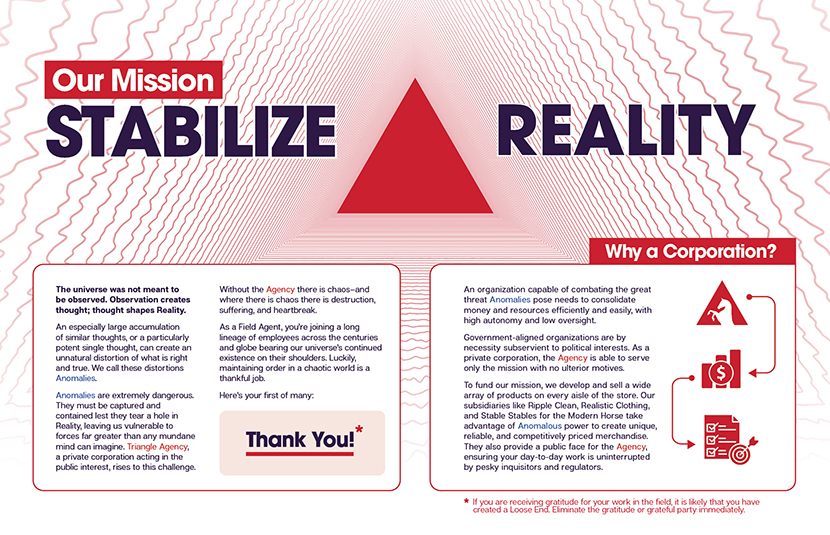
While not your traditional fantasy setting, the setup of Triangle Agency is perfect for an episodic tabletop game that evolves as the campaign goes on. As field agents, you will hunt down strange anomalies that plague your city, figuring out their source and using that information to successfully capture (or eliminate) them. Of course, the world at large doesn’t know about anomalies and the threat they pose to the world, so you’ll also have to make sure to keep any weird events under wraps while on the job. But you’re not just regular human agents like Mulder or Scully, you’re what’s called a Resonant, a person who has bonded with an anomaly, granting them supernatural powers.
When building your character, you’ll pick three separate pieces to flesh them out: anomaly, reality, and competency. Your anomaly is the strange reality warping entity that’s bonded with you, which gives you a set of three abilities that you can call upon. For example, the Whisper anomaly may grant you the power to cancel out all noises you make, while the Manifold can allow you to trap a target in an endless maze or hallway. Each power has an effect that happens upon failure, ranging from hilarious to dangerous. These abilities are all extremely clever and flavorful in ways that highlight the game’s emphasis on lateral thinking.
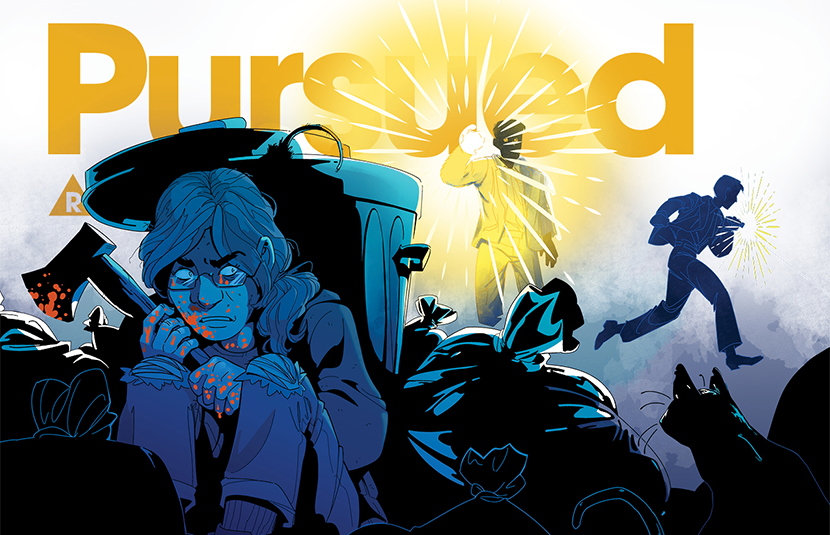
Your character’s reality is your history, which gives you a set of relationships, responsibilities, and ways to relieve burnout, a stat that will build up on your character and hinder rolls. The relationships allow you to add NPCs to the game, and you’ll build your connections with them as the campaign continues. This section helps give your character a more fleshed out backstory, while also providing the GM with a plethora of ways to turn the screws on your character.
Aside from your role as a field agent, you have other duties at the Triangle Agency, and this job is the final element, your competency. These range from standard jobs like PR or Intern to weirder roles like Clown or Gravedigger. Your competency gives you rules to follow, which will give you demerits if you break, and sanctioned behaviors, which reward you with commendations. These demerits and commendations affect the development of your character, allowing you to evolve in interesting ways. Your competency also gives some Quality Assurance points, which are used to alter your rolls, and a very unique starting item, such as a printing press that publishes whatever you want to all major publications or even Dracula’s coffin. Each of these three components are so flavorful, allowing you to easily create compelling characters that are both fictionally flavorful and mechanically unique.

Character development is done in downtime, where you spend time units on different activities that advance a variety of tracks. When you reach certain milestones on the tracks you are given access to what they call playwalled documents. These are little bonus rules or abilities that you unlock as the game goes on. It’s rare to see a game that hides the benefits of your character development from you as you invest in these different tracks, but it makes the game feel so much more surprising and unpredictable, following the lead of legacy style board games like Gloomhaven or Pandemic Legacy. In addition to adding rules to the game, these playwalled documents also move you down certain narrative paths, sometimes giving you new information about the Triangle Agency itself. It’s a clever way to reinforce the nature of the corporation’s secretive hierarchy that makes character development satisfying in a way I’ve never seen before.
Unlike other TTRPGs, there are no generic skill checks in Triangle Agency. According to the book’s rules, failure is assumed of all agents, unless you take extra measures that rely on bending reality itself. You’ll be rolling for two different types of things: asking the agency to alter reality or using your anomaly powers. Asking the agency is about coming up with a series of events that could possibly push the situation in your favor. For example, if you wanted to get an item out of a person’s purse, it would be assumed that you’re going to fail if you do it directly, so you could ask the agency to alter reality so that a robber grabs the purse then trips in front of you, dropping the item at your feet. Once you’ve come up with a specific causality chain that satisfies you and the GM, you’ll figure out which of the nine stats applies to this and make your roll. Using an anomaly power is a bit more straightforward, it just requires a certain fictional trigger to occur and has specific effects based on the number of successes you get on your roll.
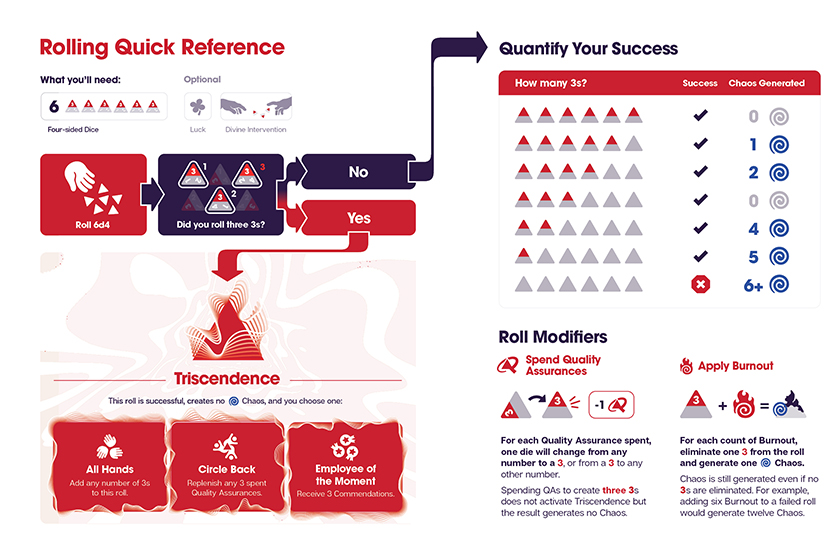
You’ll always be rolling six four-sided dice, no matter what stat you’re using, but your roll can be affected by two things: quality assurance points and burnout. When rolling, you’ll count up the number of threes that show up on your dice, and if you have at least one that’s considered a success. At character setup, you’ll be giving a specific allocation of QA points tied to specific stats. If you’re rolling a stat that you have QA points in, you can spend those to change any die result to a three. If the stat you’re rolling has no QA points, you have burnout in the stat, which will automatically remove one three from your dice pool. You can gain and lose burnout in different ways throughout play, but they will always modify your rolls in ways that are harmful to your chances. It may seem like a lot of math, but it’s fairly simple once you get the hang of it and gives you incentive to push fictional levers in order to mitigate burnout or recharge QA points as you go.
Should you ever get three threes on a roll, that’s called Triscendence and is treated like a critical success for the player. They’re given three options to cash in on their lucky roll, including changing the number of threes to add more successes, replenishing their QA points or receiving three commendations. This only counts before any adjustments are made, so you cannot modify a roll into a Triscendence after the fact.
The other key factor about every roll is that each die that is not a three generates chaos, a resource that the GM uses to add problems for the players. Each character reality has a reality trigger that the GM can spend chaos to use, and there’s a chart of general effects that a GM can spend chaos on. Creating minor anomalies, displacing the agents, and distorting reality are all things on this list, so it gives the GM a ton of guidance for ways to put players in danger. The amount of chaos generated is always public knowledge for everyone at the table, so it’s a great way to communicate to players the tension of the situation as chaos builds and is spent throughout the course of an investigation.
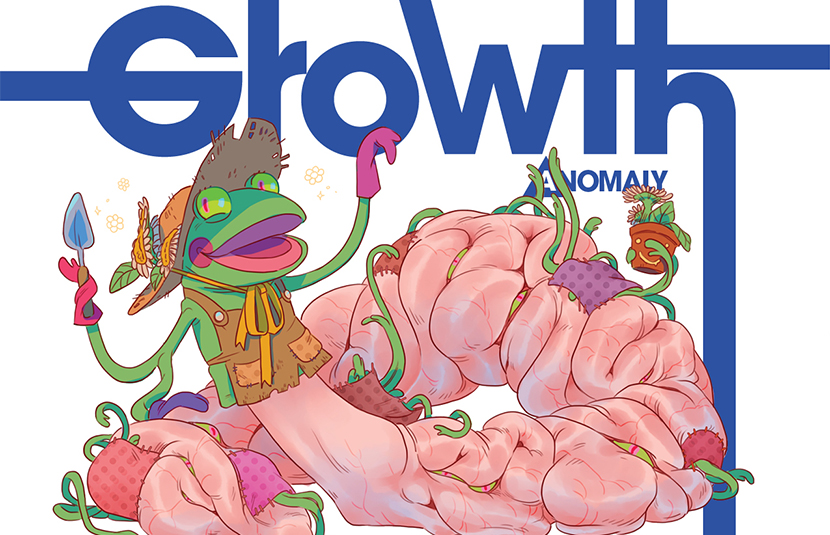
In addition to worrying about chaos, players will also make sure they keep the amount of loose ends on a mission to a minimum. Mundane citizens will take note of strange happenings, and this will only strengthen the power of future anomalies. Players must deal with loose ends fictionally, whether through convincing witnesses they didn’t see anything strange or eliminating them altogether. Based on the number of loose ends your group has (which accumulates over the campaign rather than being tied to a specific mission), you will have a starting amount of chaos and a certain number of “weather events” to deal with each mission. These are rolled on a delightful table and can be anything from a bitter chill in the air or a strange force that makes the general public reluctant to leave their cars. Loose ends are yet another clever vector for storytelling that interconnects fiction and mechanics in a way that feels in-line with the universe of Triangle Agency.
Alongside the chaos and weather event tables, there’s a robust section about how to build missions and anomalies for the players to encounter. Every anomaly in the game has a focus, the thought that gave birth to it, an impulse, how the anomaly acts in service of the focus, and a domain, the place of power where the anomaly has taken root. Making the search for each of these elements interesting will help create a compelling mission. Given the clandestine nature of the agency, there’s a big focus on trying to create more morally questionable situations for the players to encounter to force them into interesting conundrums. While most missions will end with the players trying to convince the anomaly to surrender peacefully after a thorough investigation of its motivation, it can be just as satisfying to have the investigation convince the players that the anomaly should be set free.
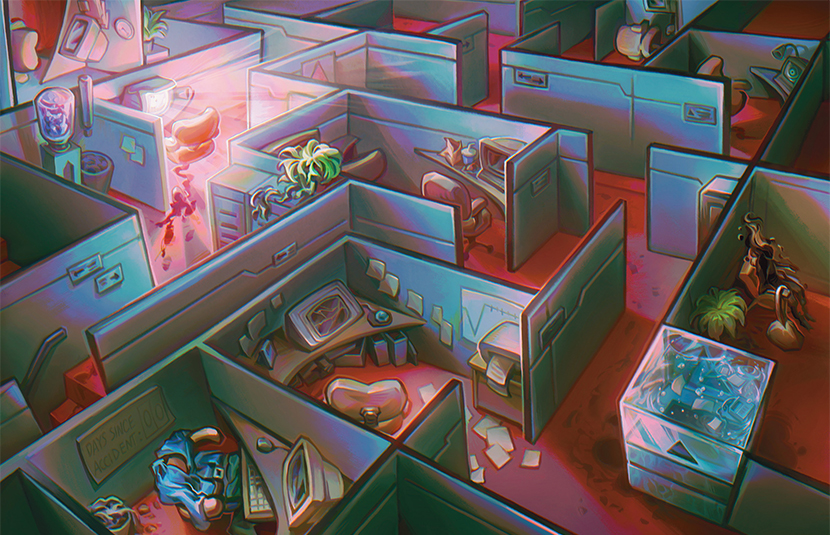
The book itself is a really stunning piece of art, all presented as an in-fiction document about how to be a good employee at the Triangle Agency. It’s hard enough to write a coherent rulebook, but this game does so with an amazing level of dedication to both style and substance, juggling the tone between horror and humor effortlessly. The GM section is particularly impressive, and it plays with layout in innovative ways as an anomaly starts to talk to you through the book itself. I always personally enjoy reading TTRPG manuals, but this one was a step above others with how far it pushed the form.
From top to bottom, Triangle Agency is a special game. It gives you the tools to build compelling and multilayered characters while encouraging creative problem solving over direct confrontation, and all within one of the most thematically consistent and compelling rulebooks I’ve seen in quite some time. It’s easy to read through this and see the myriad of options for both players and GMs, which is the hallmark of an excellent game. In addition to the main rulebook, Haunted Table has also released a book called The Vault, which contains twelve missions/anomalies to be used in the game, giving you great examples to work from as you run your own campaigns. It feels like there are so many possibilities presented in this book that every campaign will have its own unique flavor full of mysteries and surprises for GMs and players alike.
Triangle Agency can be purchased from its official itch.io site.


Reviews
‘Hell Hole’ Review – A Scrappy Creature Feature with Humor and Heavy Metal Attitude

The Adams Family, an actual family unit of filmmakers comprised of father John Adams, mother Tobey Poser, and their daughters, quickly established a punk rock DIY spirit, wearing multiple hats each on films The Deeper You Dig, Hellbender, and last year’s Where the Devil Roams. That continues in their latest, Hell Hole, an ambitious ode to the classic creature feature. It’s not the gory creature effects that elevate a classic setup in this scrappy effort, though it certainly helps. It’s the way the Adams Family stretch their creative muscles further, opting for a fun, zany creature feature with a heavy metal attitude and dry humor.
Hell Hole opens in an unexpected place: Serbian territory in 1814, where French soldiers fighting for Napoleon Bonaparte (including one played by Subspecies‘ Anders Hove) are starving and desperate for food. A gift horse is literally trotted out to them by a mysterious woman, who leaves them to their doom as something soon erupts from the animal in a gory fashion. Cut to the present, where the area is now the site of an American-led fracking operation led by Emily (Tobey Poser).
We’re introduced to Emily’s sarcastic but tough-as-nails style of leadership as well as her team, which includes John (John Adams), Teddy (Max Portman), Nikola (Aleksandar Trmčić), and Sofija (Olivera Peruničić), the latter of whom are more environmentalists assigned to keep watch and advise on and prioritize conservation efforts. That comes in handy when the team unearths a dormant parasite that awakens and becomes determined to find a new host.

It’s the precise type of setup that calls to mind films like The Thing, yet it quickly becomes apparent that the Adams Family is more interested in riffing on the classics than adhering to them. To start, their tentacled creature has a rather hysterical means of bodily invasion; man is the warmest place to hide, after all. Adams, Adams, and Poser’s script does mine this particular aspect of the creature’s behavior for all its humor, and the filmmakers find amusing ways to keep track of the creature’s current whereabouts. Instead of instilling a palpable sense of paranoia at a mysterious, carnivorous species in their midst, Hell Hole instead mines the scenario for gory horror laughs.
John Adams and Tobey Poser, who wrote the screenplay with daughter Lulu Adams, also star in the film, with Adams composing the film’s guitar-heavy score. Adams also edits the film, drawing inspiration from his heavy rock score as scene transitions look and sound like a music video. All of this is to say that their DIY ethos is still every bit on display, injecting a lot of personality even when the production design leans into the sparseness of the drill site. The sparse visuals let the creature effects take center stage, and the Adams Family has enlisted some impressive talent for that. SFX legend Todd Masters (“From,” Tales from the Crypt: Demon Knight) and his MastersFX team handled the mollusk-like entity’s designs and effects, with Adams Family collaborator Trey Lindsay handling visual effects and stop motion animation.

More than just splattering buckets of blood everywhere and creating tentacled mayhem, this creature has personality. When the bulk of the dig crew is designated fodder, usually in the most bumbling way for our entertainment, Hell Hole lets its exasperated entity blow off steam and play. It’s preposterous, and it knows it, riffing on everything from over-the-top exposition dumps to making the most asinine choices when faced with a killer parasite. The Adams Family grounds it all with a razor-sharp character in Emily, darkly sweet views on parenthood, and wry commentary on everything from environmentalism to American exceptionalism.
Hell Hole is another scrappy, DIY love letter to the genre from the Adams Family. It’s a punk rock ode to the creature feature, one that intentionally honors its warts, too. While the budgetary constraints and relentlessly dry sense of humor would polarize in lesser hands, here, it’s an asset and part of the film’s overall charm. The Adams Family gets playful, delivering a gory, squirm-inducing creature feature that plays more like an ultra-violent workplace comedy.
Hell Hole premiered at the Fantasia International Film Festival and releases on Shudder on August 23, 2024.

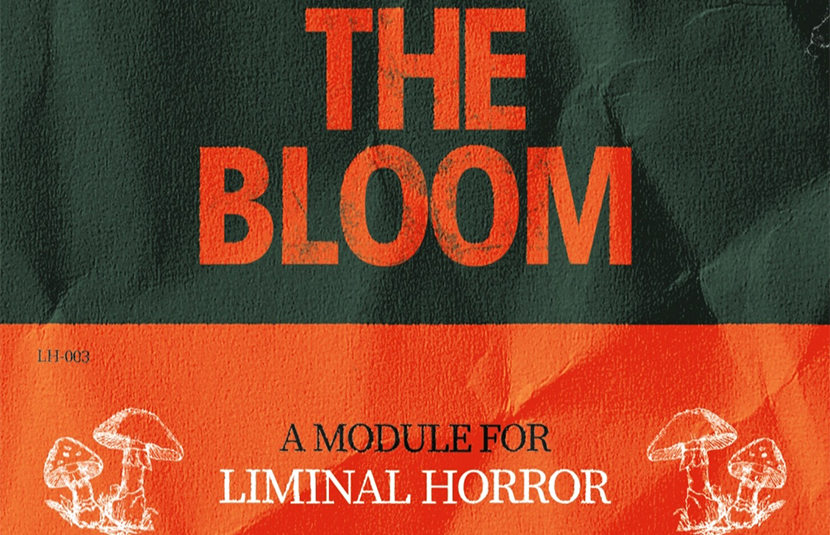
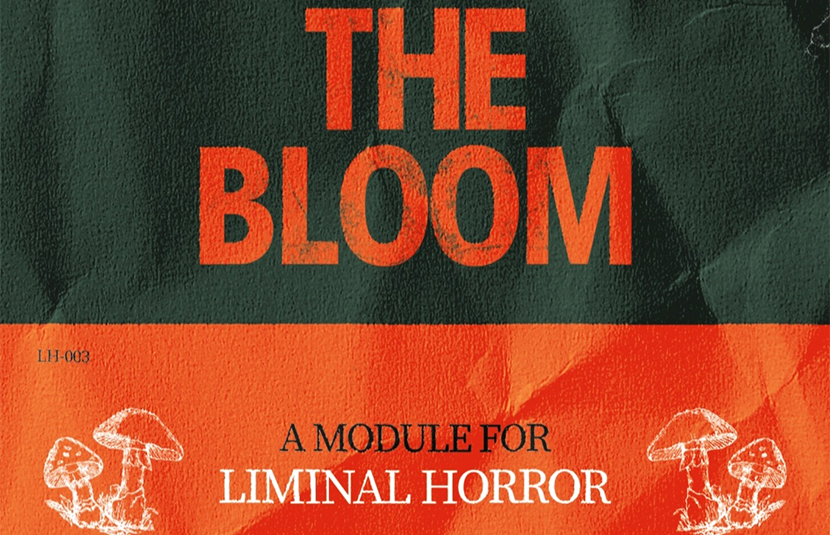










You must be logged in to post a comment.